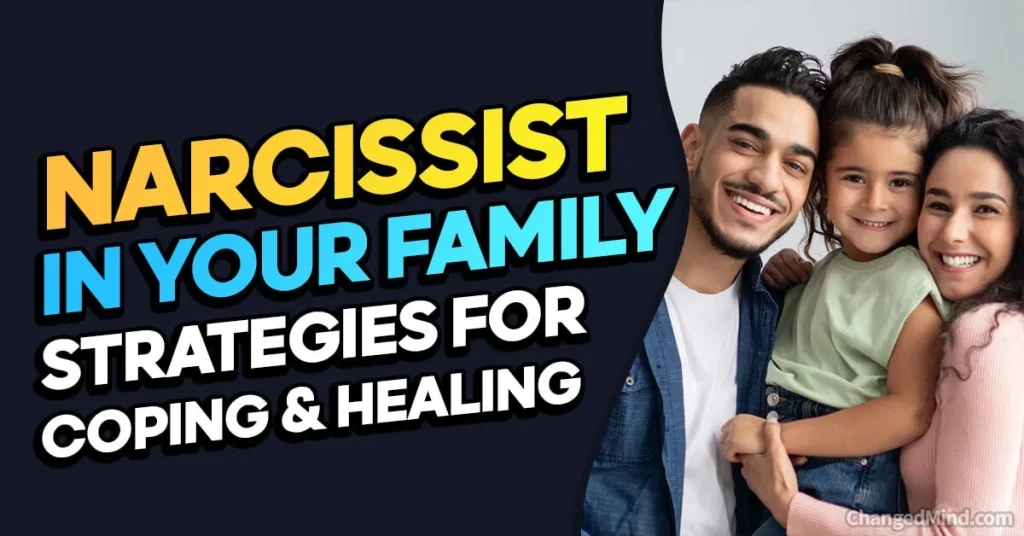Picture this: a family gathering filled with laughter, inside jokes, and the occasional eye roll. But what happens when one family member takes center stage, demanding all the attention and leaving you feeling like a supporting character in their grand production? Welcome to the complex world of dealing with a narcissistic family member.
In this article, we’ll explore what to do When Your Family Sides With The Narcissist along with practical strategies to reclaim your sanity, set boundaries, and find your voice in the midst of this challenging dynamic. Buckle up, because we’re about to dive deep into the murky waters of narcissism and discover how to come out on top.
Short Answer: So, what should you do when your family sides with the narcissist? Hold on tight, because we’re about to equip you with the tools and insights you need to navigate this tricky situation. From understanding narcissistic behavior to setting boundaries, seeking support, and finding your own voice, we’ve got you covered.
In this article, we’ll cover:
- Understanding narcissism and its impact on family dynamics.
- Recognizing the signs of a narcissistic family member.
- Coping strategies to protect your emotional well-being.
- Effective communication and assertiveness techniques.
- Seeking professional help and the role of therapy.
- Embracing self-acceptance, personal growth, and creating a supportive network.
Get ready to reclaim your power and rewrite the narrative. Let’s dive in!
Defining Narcissism and its Impact
Narcissism, stemming from the Greek mythological character Narcissus, refers to an excessive preoccupation with oneself and a grandiose sense of self-importance. Individuals with narcissistic traits often prioritize their own needs and manipulate others to maintain their self-image.
When a family member exhibits narcissistic behavior, it can disrupt the entire family dynamic. They may belittle others, seek constant admiration, and disregard the feelings and opinions of those around them. This toxic behavior creates an unhealthy and imbalanced environment, causing emotional distress for those affected.
The Challenging Scenario: When Family Members Side with the Narcissist
One would hope that family would provide a safe haven and unwavering support. However, it can be disheartening and disorienting when your own family members side with the narcissist in your midst. It feels as though your concerns are dismissed, and your experiences are invalidated.
It is crucial to acknowledge that this situation is not your fault. The dynamics at play are complex, often influenced by manipulation, gaslighting, and the narcissist’s ability to charm and manipulate those around them. While it may be painful to witness your family aligning with the narcissist, understanding the factors at play can help you navigate this challenging situation.
The Importance of Addressing the Issue
Dealing with a narcissistic family member and a family that sides with them can have severe consequences for your emotional well-being. It can lead to feelings of isolation, self-doubt, and a distorted sense of reality. Ignoring or accepting this behavior can perpetuate a cycle of abuse and prevent personal growth and healing.
By addressing this issue head-on, you empower yourself to regain control of your life and protect your emotional well-being. It’s a brave step towards breaking free from the toxic patterns that have held you back, fostering healthier relationships, and finding inner peace.
Remember, you deserve to be heard and validated. In the next sections, we will explore strategies and coping mechanisms to help you navigate this challenging journey. Let’s embark on this path to healing together.
Understanding Narcissism and Manipulation Tactics

Overview of Narcissistic Personality Traits and Behaviors
To effectively navigate the challenging situation of having your family side with the narcissist, it’s crucial to understand the fundamental traits and behaviors associated with narcissism. This knowledge empowers you to recognize and address their manipulative tactics.
Narcissists often exhibit the following traits:
- Grandiose self-importance: They have an inflated sense of their own importance and believe they are superior to others.
- Lack of empathy: They struggle to understand or care about the feelings and needs of others.
- Constant need for admiration: They crave attention, praise, and validation, often seeking it at the expense of those around them.
- Sense of entitlement: They believe they deserve special treatment and privileges, disregarding the rights and boundaries of others.
- Exploitation of others: They manipulate and exploit individuals to achieve their own goals and maintain their self-image.
Recognizing these traits helps you comprehend the narcissist’s underlying motivations and provides insight into their manipulative tactics.
Common Manipulation Tactics Used by Narcissists
Narcissists employ various manipulation tactics to control and manipulate those around them. Understanding these tactics equips you with the necessary tools to counter their influence and protect yourself:
- Gaslighting: They distort your perception of reality, making you doubt your own memories, feelings, and experiences.
- Projection: They attribute their own negative qualities or behaviors onto others, deflecting blame and avoiding accountability.
- Triangulation: They create conflicts between individuals by manipulating communication, fostering division within the family.
- Emotional manipulation: They exploit your emotions, using guilt, shame, or fear to gain control and maintain power over you.
- Isolation: They systematically isolate you from support networks, making you dependent on them and reducing your ability to seek help.
By understanding these manipulation tactics, you can identify when they are being used against you, empowering you to respond effectively and protect your emotional well-being.
Impact on Family Dynamics when a Narcissist is Involved
The presence of a narcissistic family member significantly affects the dynamics within the family unit. Their manipulative behavior can create a toxic and dysfunctional environment, leading to:
- Enabling behavior: Some family members may enable the narcissist’s actions, either out of fear, misguided loyalty, or a desire to avoid confrontation.
- Scapegoating: The narcissist may designate one family member as the scapegoat, blaming them for all issues within the family to deflect attention from their own behavior.
- Golden child syndrome: On the other hand, they may favor one family member, showering them with praise and attention, creating resentment and division among siblings.
- Flying monkeys: The narcissist may manipulate other family members to act as “flying monkeys” who further their agenda and attack or discredit those who question or oppose them.
These dynamics can result in strained relationships, emotional turmoil, and a distorted sense of self. Recognizing these patterns is the first step towards reclaiming control and healing from the toxic effects of a narcissistic family member.
Expert Says
Sharonda “Nya B” Brown, MA, NCC, LPC
Licensed Mental Health Clinician and National Board Certified Counselor

Understanding narcissism, manipulation tactics, and the impact on family dynamics equips you with the knowledge needed to navigate the challenging situation of having your family side with the narcissist. In the following sections, we will delve deeper into coping strategies and techniques to help you reclaim your power and foster a healthier, happier life.
Recognizing the Signs
Identifying Red Flags and Warning Signs of a Narcissistic Family Member
It’s crucial to be able to recognize the red flags and warning signs of a narcissistic family member. By doing so, you can gain clarity about the dynamics at play and protect yourself from their manipulations. Here are some signs to look out for:
- Excessive need for admiration: They constantly seek validation, attention, and praise from others, often fishing for compliments or exaggerating their achievements.
- Lack of empathy: They struggle to understand or care about the feelings and experiences of others, dismissing or belittling their emotions.
- Constant need to be the center of attention: They always want to be in the spotlight, steering conversations and making everything about themselves.
- Manipulative behavior: They use various tactics such as gaslighting, guilt-tripping, and emotional blackmail to control and dominate those around them.
- Difficulty accepting criticism: They become defensive or hostile when confronted with their flaws or mistakes, deflecting blame onto others.
Understanding the Dynamics of Enabling Behavior within the Family
When your family sides with the narcissist, it often involves enabling behavior from certain family members. Understanding this dynamic is essential to comprehend why they align with the narcissist and how it affects the overall family dynamic.
Enabling behavior can manifest in several ways, such as:
- Fear of confrontation: Family members may avoid challenging the narcissist due to fear of their volatile reactions or the desire to maintain peace, even at the expense of your well-being.
- Misguided loyalty: Some family members may have developed a deep sense of loyalty to the narcissist, defending and supporting them regardless of their harmful actions.
- Belief in the narcissist’s facade: The narcissist’s charm and ability to present a charming facade can deceive family members, causing them to believe the narcissist’s distorted version of reality.
- Benefiting from the narcissist’s behavior: Certain family members may derive personal gain or validation from aligning with the narcissist, reinforcing their involvement in the toxic dynamics.
Understanding the motivations behind enabling behavior helps you approach the situation with empathy and discernment, allowing you to address the issue more effectively.
Exploring the Reasons Why Family Members May Side with the Narcissist
It’s essential to explore the reasons why family members may side with the narcissist, as it can shed light on their perspective and enable you to navigate the situation more compassionately.
Some common reasons why family members side with the narcissist include:
- Manipulation and grooming: The narcissist may have manipulated certain family members over time, exploiting their vulnerabilities or leveraging their existing insecurities.
- Ignorance or lack of awareness: Family members may not fully understand the dynamics of narcissism and its impact on relationships, leading them to unintentionally side with the narcissist.
- Emotional dependence: The narcissist may have fostered a codependent relationship with certain family members, making them reliant on their validation and support.
- Shared traits or unresolved issues: Family members who possess narcissistic traits themselves or have unresolved emotional issues may align with the narcissist due to a sense of familiarity or shared experiences.
By exploring these reasons, you can develop a more empathetic perspective and identify potential avenues for communication and healing within your family.
Recognizing the signs, understanding enabling behavior, and exploring the reasons behind family members siding with the narcissist provides valuable insights into the complexities of the situation. Armed with this knowledge, you can approach the next steps of coping, healing, and fostering healthier family dynamics.
10 Tips for How to Deal With a Narcissistic Family Member
Dealing with a narcissistic family member can be incredibly challenging, but it’s not impossible. Here are 10 practical tips to help you navigate this difficult situation:
1. Educate Yourself about Narcissism
Gain a deeper understanding of narcissism and its impact on family dynamics. This knowledge will empower you to recognize manipulative tactics and set appropriate boundaries.
2. Set Boundaries and Stick to Them
Establish clear boundaries to protect your emotional well-being. Communicate your boundaries calmly and assertively, and be consistent in enforcing them. Remember, you have the right to prioritize your own needs.
3. Focus on Self-Care
Self-care is crucial when dealing with a narcissistic family member. Engage in activities that bring you joy, practice mindfulness or meditation, exercise regularly, and prioritize your mental and physical health.
4. Seek Support Outside the Family
Build a support network of trusted friends, therapists, or support groups who can offer guidance, validation, and understanding. Having people who genuinely care about your well-being can provide immense comfort.
5. Practice Emotional Resilience
Develop emotional resilience to withstand the emotional manipulation from the narcissistic family member. Strengthen your emotional core through therapy, self-reflection, and practicing self-compassion.
6. Communicate Effectively
When communicating with the narcissistic family member, stay calm and composed. Use “I” statements to express your feelings and needs, and be prepared for potential gaslighting or manipulation. Seek professional guidance to improve your communication skills if needed.
7. Avoid Engaging in Power Struggles
Narcissists thrive on power struggles and attention. Refuse to engage in their manipulative games. Instead, focus on your own well-being and disengage from conflicts that drain your energy.
8. Document Incidents and Seek Validation
Keep a record of instances where the narcissistic family member engages in abusive or manipulative behavior. This documentation can provide validation for your experiences and serve as evidence if needed.
9. Practice Self-Reflection and Growth
Engage in self-reflection to understand your own vulnerabilities and triggers. Work on personal growth by seeking therapy or counseling to heal from the effects of narcissistic abuse and break free from toxic patterns.
10. Accept the Reality and Set Realistic Expectations
Accept that you may never change the narcissistic family member. Focus on accepting the reality of the situation and set realistic expectations. Direct your energy toward building a fulfilling life outside of their influence.
Remember, you are not alone in this journey. Reach out for support, practice self-care, and prioritize your well-being. You have the strength to navigate the challenges of a narcissistic family member and create a brighter future for yourself.
Coping Strategies
Self-care and Setting Healthy Boundaries
When your family sides with the narcissist, it’s essential to prioritize self-care and establish healthy boundaries to protect your emotional well-being. By focusing on your own needs and setting clear limits, you can reclaim your power and regain control over your life.
Importance of Self-care Practices for Emotional Well-being
Self-care is not selfish; it is a vital component of maintaining your emotional well-being in the face of challenging family dynamics. Here are some self-care practices that can help you navigate this difficult situation:
- Prioritize your mental and physical health: Engage in activities that bring you joy and relaxation, such as exercise, meditation, hobbies, or spending time in nature.
- Practice self-compassion: Be kind to yourself and acknowledge that you are doing your best in a challenging situation. Treat yourself with the same care and understanding you would offer a close friend.
- Seek professional help: Consider therapy or counseling to receive support from a trained professional who can guide you through the healing process and provide valuable insights.
Self-care allows you to replenish your emotional reserves, build resilience, and maintain a positive mindset despite the challenges you face.
Establishing Boundaries to Protect Oneself from Manipulation
Setting boundaries is crucial when dealing with a narcissistic family member and those who side with them. Establishing clear limits helps protect your well-being and preserves your sense of self. Here are some steps to help you establish and enforce boundaries:
- Identify your limits: Reflect on what is acceptable and unacceptable to you in terms of behavior, communication, and treatment from family members and the narcissist.
- Communicate assertively: Clearly and assertively express your boundaries to others, using “I” statements to convey your needs and expectations.
- Be consistent: Enforce your boundaries consistently, even if others try to push against them. This sends a clear message that you value and respect yourself.
Remember, setting boundaries may initially be met with resistance, but stay firm in prioritizing your well-being. Over time, others may come to respect and adapt to your boundaries.
Seeking Support from Trusted Individuals
When faced with a situation where your family sides with the narcissist, seeking support from trusted individuals can provide invaluable guidance, validation, and comfort. Surrounding yourself with a supportive network is crucial for your well-being and helps counteract the isolation you may feel.
Identifying Supportive Friends, Partners, or Professionals
During challenging times, it’s important to lean on those who truly understand and empathize with your experiences. Consider the following when identifying individuals who can offer support:
- Friends: Reach out to friends who have shown understanding and compassion in the past. True friends will lend an empathetic ear and offer support without judgment.
- Partners: If you have a supportive partner, confide in them about your situation. A loving and caring partner can provide emotional support and be a strong source of comfort.
- Professionals: Seek guidance from therapists or counselors who specialize in narcissistic abuse or family dynamics. These professionals can provide professional insights, tools, and coping strategies tailored to your specific situation.
Remember, you don’t have to face this alone. Reach out to trusted individuals who can offer a listening ear, guidance, and validation.
Utilizing Support Networks to Share Experiences and Seek Guidance
Support networks, such as online communities or support groups, can be invaluable resources for individuals dealing with narcissistic family dynamics. These networks offer a safe space to share experiences, gain insights, and seek guidance from others who have faced similar challenges. Consider the following avenues for connecting with support networks:
- Online forums and communities: Join online communities or forums dedicated to supporting individuals dealing with narcissistic abuse or toxic family dynamics. These platforms provide a space to share stories, ask questions, and receive advice from a diverse range of individuals.
- Local support groups: Look for local support groups or therapy groups that specifically address narcissistic abuse or family-related challenges. Participating in these groups can help you build a sense of community and find solace in knowing that you are not alone.
By connecting with support networks, you can find solace in the shared experiences of others, gain insights into coping strategies, and receive the validation and understanding you deserve.
Developing Emotional Resilience
Building emotional resilience is essential when dealing with the challenging dynamics of a family that sides with a narcissist. It equips you with the strength and tools necessary to navigate the difficulties and protect your well-being.
Building Emotional Strength and Resilience through Therapy or Counseling
Therapy or counseling can be instrumental in building emotional strength and resilience. Here’s how professional guidance can aid your journey:
- Gaining clarity and perspective: Therapy provides a safe and non-judgmental space to explore your feelings, gain insights into your experiences, and develop a deeper understanding of the dynamics at play.
- Learning coping mechanisms: A skilled therapist can help you develop effective coping mechanisms tailored to your unique circumstances. These strategies empower you to navigate challenging family dynamics and maintain your emotional well-being.
- Addressing trauma and healing: Therapy facilitates the healing process by addressing any underlying trauma caused by the narcissistic family dynamics. It offers a path to process emotions, build resilience, and ultimately find a sense of peace and closure.
Therapy or counseling is a powerful tool that supports personal growth, fosters healing, and strengthens your emotional resilience in the face of narcissistic family dynamics.
Learning Effective Coping Mechanisms to Navigate Challenging Family Dynamics
In addition to therapy, there are practical coping mechanisms you can incorporate into your daily life. Consider the following strategies to help navigate the challenges posed by the narcissist and your family:
- Self-reflection and mindfulness: Engage in self-reflection to understand your own triggers and emotional responses. Practice mindfulness techniques to stay present and grounded during difficult interactions.
- Educate yourself: Learn more about narcissism, toxic relationships, and healthy boundaries. Knowledge is empowering and equips you with the tools to respond effectively.
- Focus on personal growth: Invest in your own personal growth and development. Pursue hobbies, interests, and goals that bring you fulfillment and a sense of purpose outside of the family dynamic.
By developing emotional resilience and implementing effective coping mechanisms, you can reclaim your power, navigate the complexities of narcissistic family dynamics, and prioritize your well-being.
Seeking support from trusted individuals and developing emotional resilience are essential steps in the journey of healing and reclaiming control when your family sides with the narcissist. In the next section, we will explore communication and assertiveness techniques to help you navigate conflicts and maintain your boundaries.
Communication and Assertiveness Techniques
When dealing with a situation where your family sides with the narcissist, effective communication and assertiveness skills are essential tools to navigate conflicts and maintain your boundaries. By employing these techniques, you can express your needs, opinions, and boundaries with confidence and clarity.
Effective Communication Strategies When Confronting Family Members
Confronting family members who side with the narcissist can be challenging, but effective communication strategies can help you express your concerns and needs more assertively. Consider the following techniques:
- Use “I” statements: When expressing your feelings or concerns, use “I” statements to convey your experiences without placing blame. For example, say, “I feel hurt when…” instead of “You always…”
- Active listening: Practice active listening by giving your full attention to the other person’s perspective. Validate their feelings and ensure they feel heard before expressing your own thoughts.
- Choose the right timing: Pick an appropriate time and place for discussions, ensuring privacy and minimizing distractions. Avoid engaging in heated conversations when emotions are running high.
By using these communication strategies, you can create a more open and constructive dialogue with family members, increasing the chances of mutual understanding and resolution.
Developing Assertiveness Skills to Express Personal Boundaries and Opinions
Developing assertiveness skills is crucial when dealing with a narcissistic family member and family members who side with them. Assertiveness empowers you to express your boundaries and opinions confidently, without aggression or passivity. Consider the following tips:
- Know your rights: Understand and internalize that you have the right to your own thoughts, opinions, and boundaries. Your voice matters, and your needs are valid.
- Practice assertive body language: Stand tall, maintain eye contact, and speak with a clear and confident tone. Non-verbal cues can enhance your assertiveness and demonstrate your self-assurance.
- Use clear and direct language: State your boundaries, needs, and opinions in a clear and direct manner, without ambiguity or excessive explanations.
Remember, asserting yourself may be met with resistance, especially from the narcissist and those who enable their behavior. Stay firm in expressing your boundaries and opinions while remaining respectful and composed.
Managing Conflicts and Diffusing Tense Situations with the Narcissist and Family Members
Managing conflicts and diffusing tense situations is essential when navigating the dynamics of a family that sides with the narcissist. Consider the following strategies:
- Set boundaries and stick to them: Clearly communicate your boundaries and consequences for crossing them. Be consistent in upholding these boundaries, even in the face of resistance.
- Avoid engaging in power struggles: Narcissists thrive on power struggles and manipulation. Refuse to engage in arguments or debates that serve no constructive purpose.
- Seek external support: If conflicts become overwhelming, seek the help of a therapist, counselor, or support group to gain guidance and perspective.
Remember, managing conflicts with a narcissistic family member requires resilience and a focus on your own well-being. Choose your battles wisely, prioritize self-care, and seek support when needed.
By employing effective communication strategies, developing assertiveness skills, and managing conflicts with tact and resilience, you can navigate the complexities of a family that sides with the narcissist. In the next section, we will explore the path to healing, personal growth, and moving forward from toxic family dynamics.
Seeking Professional Help
When faced with the complexities of a family that sides with the narcissist, seeking professional help through therapy or counseling can be instrumental in addressing family dynamics, fostering personal growth, and facilitating healing. Professional guidance provides valuable insights, tools, and support to navigate the challenges you may encounter.
The Role of Therapy or Counseling in Addressing Family Dynamics
Therapy or counseling plays a crucial role in addressing family dynamics when dealing with a narcissistic family member and those who side with them. Here’s how therapy can help:
- Understanding and validation: A therapist provides a safe and non-judgmental space for you to share your experiences and emotions. They offer validation, helping you understand that your feelings and reactions are valid and understandable given the circumstances.
- Gaining clarity and perspective: Through therapy, you can gain a deeper understanding of the dynamics at play within your family. This newfound clarity helps you navigate the challenges more effectively and make informed decisions.
- Developing coping strategies: Therapists equip you with coping mechanisms and tools tailored to your specific situation. These strategies empower you to establish boundaries, manage conflicts, and protect your emotional well-being.
- Healing from past trauma: Narcissistic family dynamics can lead to emotional trauma. Therapy provides a path to address and heal from this trauma, helping you move forward in your healing journey.
Types of Therapeutic Approaches Beneficial for Dealing with Narcissistic Family Situations
Several therapeutic approaches can be beneficial when dealing with narcissistic family situations. These approaches are designed to address the unique challenges associated with narcissistic abuse and toxic family dynamics. Some effective therapeutic modalities include:
- Cognitive-Behavioral Therapy (CBT): CBT focuses on identifying and changing negative thought patterns and behaviors. It helps you challenge distorted beliefs, develop healthier coping strategies, and improve your overall well-being.
- Dialectical Behavior Therapy (DBT): DBT combines elements of CBT with mindfulness techniques. It assists in regulating emotions, managing distress, and building interpersonal effectiveness skills.
- Psychodynamic Therapy: Psychodynamic therapy explores underlying emotional issues, childhood experiences, and unconscious patterns that contribute to the dynamics within your family. It provides insight into how these factors influence your relationships and helps you make meaningful changes.
- Trauma-Informed Therapy: This approach specifically addresses the emotional trauma resulting from narcissistic abuse. It focuses on processing and healing from past trauma, building resilience, and restoring a sense of safety.
How Professional Guidance Can Aid in Personal Growth and Healing
Professional guidance through therapy or counseling offers a multitude of benefits for personal growth and healing. Here’s how it can aid you on your journey:
- Emotional support: Therapists provide a supportive and empathetic environment where you can freely express your emotions and experiences. They offer guidance and encouragement as you navigate the challenges of healing from narcissistic family dynamics.
- Objective perspective: Therapists bring an unbiased and objective perspective to your situation. They help you gain insight into patterns, dynamics, and behaviors that may be difficult to see from within the family system.
- Tools and strategies: A skilled therapist equips you with practical tools and strategies to manage conflicts, establish boundaries, and communicate effectively with family members. These resources empower you to navigate the complexities of your family dynamics more confidently.
- Personal growth and empowerment: Therapy fosters personal growth by helping you develop self-acceptance, self-compassion, and self-awareness. It promotes empowerment, allowing you to make choices that prioritize your well-being and foster a healthier sense of self.
Remember, seeking professional help is not a sign of weakness, but rather a courageous step towards reclaiming your life and well-being. A skilled therapist can provide the guidance and support you need to heal, grow, and move forward from the toxic dynamics of a narcissistic family.
In the next section, we will explore the importance of self-acceptance, self-love, and personal growth on your journey to healing from a narcissistic family dynamic.
Healing and Moving Forward
Now that you have gained insights into dealing with a family that sides with the narcissist, it’s time to focus on your own healing, growth, and moving forward. Embracing self-acceptance, shifting your focus towards personal growth, and creating a supportive network outside the family are key steps on this journey.
Embracing Self-Acceptance and Self-Love
One of the most transformative steps you can take is to embrace self-acceptance and self-love. Here’s why it’s essential:
- Reclaiming your worth: Narcissistic family dynamics often erode your self-esteem and self-worth. Embracing self-acceptance allows you to recognize and affirm your inherent value as a unique individual.
- Letting go of blame and guilt: Release yourself from the burden of blame and guilt that may have been imposed upon you. Understand that you are not responsible for the narcissist’s behavior or the family members who side with them.
- Cultivating self-compassion: Treat yourself with kindness, understanding, and compassion. Offer yourself the same love and support you would extend to a dear friend going through a challenging situation.
By embracing self-acceptance and self-love, you empower yourself to heal and grow beyond the limitations imposed by a narcissistic family dynamic.
Shifting Focus Towards Personal Growth and Development
Shifting your focus towards personal growth and development is a powerful way to regain control of your life. Consider the following strategies:
- Identify your strengths and passions: Discover and nurture your unique strengths, talents, and passions. Engage in activities that bring you joy and fulfillment, allowing yourself to grow and explore new horizons.
- Set achievable goals: Establish realistic and achievable goals that align with your values and aspirations. Break them down into smaller steps to maintain motivation and celebrate each milestone achieved.
- Continual learning: Engage in lifelong learning and personal development. Attend workshops, read self-help books, and explore online resources that promote self-improvement and personal growth.
Remember, personal growth is a journey, and it’s important to embrace the process rather than focusing solely on the end result. Each step forward is a step towards reclaiming your life and finding happiness outside the toxic family dynamic.
Strategies for Creating a Supportive Network Outside the Family
Building a supportive network outside the family is vital for your well-being and growth. Consider the following strategies to create a strong support system:
- Seek out like-minded individuals: Connect with people who share similar experiences or have a deep understanding of narcissistic abuse. Online communities, support groups, and therapy groups can be excellent resources for finding individuals who can relate to your journey.
- Nurture healthy relationships: Cultivate friendships and relationships with individuals who uplift and support you. Surround yourself with people who respect your boundaries, validate your experiences, and offer a safe and nurturing environment.
- Explore professional support: Continue seeking professional help through therapy or counseling. A skilled therapist can guide you through the healing process and provide ongoing support as you navigate the challenges of moving forward.
By creating a supportive network outside the family, you establish a strong foundation of love, understanding, and encouragement that fuels your growth and resilience.
Remember, healing from the effects of a narcissistic family dynamic takes time, patience, and self-compassion. Embrace the journey of self-discovery, focus on your personal growth, and surround yourself with a support network that empowers you.
In the final section, we will summarize the key takeaways and provide closing thoughts to inspire and encourage you on your path to healing and liberation from a narcissistic family dynamic.
Conclusion
Throughout this article, we have explored the challenging situation of when your family sides with the narcissist. We delved into the characteristics of narcissism, identified manipulation tactics used by narcissists, and examined the impact on family dynamics. We also provided coping strategies, highlighted the importance of seeking professional help, and discussed the significance of self-acceptance, personal growth, and creating a supportive network.
To recap, here are the key takeaways:
- Understanding Narcissism: Narcissism is characterized by an inflated sense of self-importance, a constant need for admiration, and a lack of empathy. It can deeply impact relationships and family dynamics.
- Recognizing the Signs: It is crucial to identify the red flags and warning signs of narcissistic behavior, enabling behavior within the family, and the reasons why family members may side with the narcissist.
- Coping Strategies: Self-care and setting healthy boundaries are essential for protecting your emotional well-being. Seeking support from trusted individuals and developing emotional resilience through therapy or counseling can greatly aid your healing journey.
- Communication and Assertiveness Techniques: Effective communication strategies, developing assertiveness skills, and managing conflicts with the narcissist and family members are important for maintaining your autonomy and self-worth.
- Seeking Professional Help: Therapy or counseling plays a pivotal role in addressing family dynamics, healing from narcissistic abuse, and facilitating personal growth. Different therapeutic approaches can be beneficial in dealing with narcissistic family situations.
- Healing and Moving Forward: Embracing self-acceptance and self-love, shifting focus towards personal growth, and creating a supportive network outside the family are crucial steps in reclaiming your life and finding happiness beyond the influence of a narcissistic family member.
If you find yourself in a similar situation, we want to encourage you to seek help and prioritize your well-being. Remember, you are not alone, and there are resources available to support you on your journey to healing and liberation.
By taking the necessary steps to address the challenges posed by a narcissistic family dynamic, you can create a brighter future for yourself. It may not always be an easy path, but with determination, resilience, and the right support, you can break free from the toxic influence and create a life filled with joy, self-fulfillment, and healthy relationships.
Remember, you deserve to be surrounded by love, respect, and genuine support. Trust in your own strength, seek the help you need, and embrace the possibilities that lie ahead.
FAQ
How can I protect my emotional well-being when my family sides with the narcissist?
Prioritize self-care practices, set healthy boundaries, and seek support from trusted individuals outside the family. Focus on your own well-being and surround yourself with a supportive network.
Why do family members often side with the narcissist?
Family members may side with the narcissist due to manipulation, fear of repercussions, or a lack of awareness about the narcissistic behavior. It’s important to understand their perspectives while prioritizing your own healing.
Can therapy help in dealing with a family that sides with the narcissist?
Yes, therapy can provide valuable support and guidance. Therapists can help you navigate the challenges, develop coping strategies, and heal from the effects of narcissistic family dynamics.
How can I communicate effectively with family members who side with the narcissist?
Practice active listening, assertiveness, and clarity in your communication. Stay calm, focus on expressing your feelings and needs, and be prepared for possible resistance or manipulation.
Is it possible to have a healthy relationship with family members who side with the narcissist?
In some cases, it may be challenging to establish a healthy relationship with family members who enable the narcissist. Setting boundaries, seeking professional help, and focusing on your own well-being can help navigate these dynamics.

Disclaimer
This information is for educational purposes only and is not intended to be a substitute for clinical care. Please consult a health care provider for guidance specific to your case.






